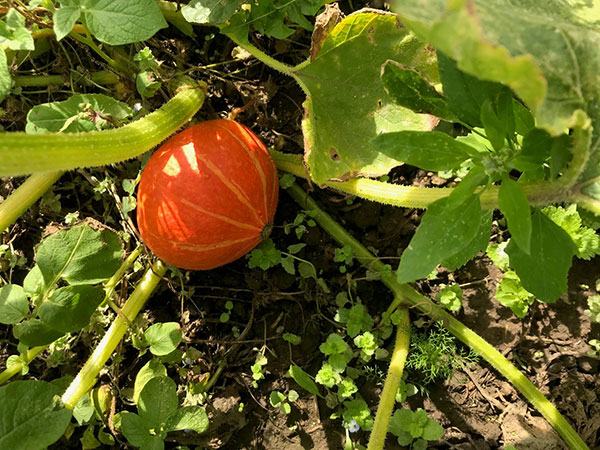Squash is usually a failsafe crop, but this has been the most difficult growing season we’ve ever had. We grow ours from seed in our nursery, and around the time we transplant them, in mid May, we had a couple of late frosts. Then later on, we had a drought and the ground was so dry we just couldn’t keep some alive.
My farm is in March, in the Fens of Cambridgeshire, so it is quite exposed. At the time of planting it was dry and very windy; it felt like planting in the Sahara Desert on some days and I don’t think the plants liked that. I would say our yields are around 40 per cent down, so it will be a shorter season than usual. It was really split across varieties; for example Green Kabocha, which is normally a really resilient variety, just didn’t take at all. On the other hand, Crown Prince and Harlequin have done quite well, as has Delicata. We do grow a small amount of Butternut, but in my opinion, it’s not well suited to our UK climate. You can grow it, but it tends to stain where it lies on the soil, so the vast majority is imported.

We grow about 25 different varieties of squash in total, including lots of mini ones. People always imagine they’re all grown together in one field, but they’re actually grown in blocks according to variety. I also grow Tenderstem broccoli, asparagus, rhubarb and Globe artichokes, as I like perennial crops (which come back year after year) and also tend to specialise in the more unusual ones.
For harvesting, five or six people will go and cut the squash by hand, before a tractor comes along with a half tonne box, with people following behind to put them in. Next, they’re taken to the squash store, an old grain barn with a ventilated floor, which we use to blow air over them to cure the tops. You need to dry the necks of squash, as once they’re dry, they’re sealed, and that stops bacteria getting in. It also hardens their skins; they’re kept in store sometimes until Christmas, before the quality starts to go.
Despite the shorter season, we still have plenty of squash to see us through. Every year comes with its own surprises, anyway; that’s one of the ‘joys’ of farming, and why I grow such a wide variety of crops.












Loved this read ! Thank you Clive
I, too, much enjoyed reading about the difficulties and pleasures of farming in the Fens. Wonderful name for a farm, too. Clarke
Good luck at Bedlam. Thanks for feeding us. Olivia
My crown prince did ok, not as big as usual. But, all the squashes on our allotments were eaten by rats within a day or two! Can’t win.
Can I ask, do you grow broccoli as a perennial, or have I misunderstood your comment. Thanks
Really interesting. Thanks Clive. Its good to understand why sometimes veg items are less abundant than usual, smaller and/or more expensive (also interesting to know what has caused gluts of course). There seems to have been a real shortage of local organic tomatoes this year, at least down here in SW England, but I keep forgetting to ask anyone why. Can anyone enlighten me?